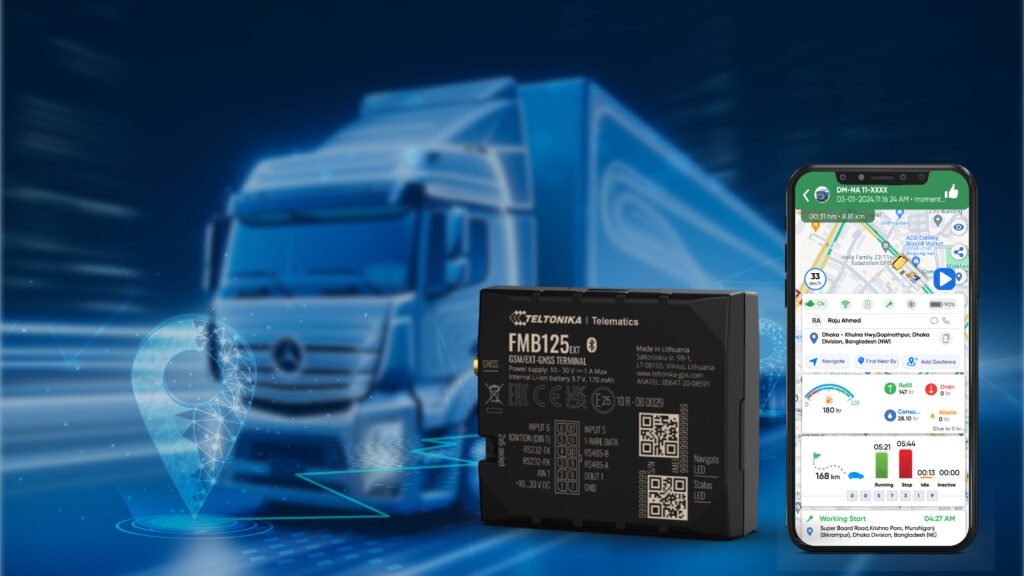
Introduction:
Fuel monitoring is a critical aspect of efficient fleet management, as fuel costs constitute a significant portion of operational expenses. In this case study, we explore the challenges faced by a tea plantation company in accurately monitoring fuel consumption and the implementation of a fuel monitoring solution to address these issues.
Client Background:
Amtali Plantation is a tea garden that specializes in producing saplings and operates its fleet of vehicles for sapling delivery. However, they faced various challenges in monitoring their vehicles and fuel usage. The region where the vehicles operated lacked proper network connectivity, which hindered effective vehicle tracking and monitoring. As a result, the management had no visibility of the vehicle’s location, daily travel distance, fuel consumption, or driver behavior. Additionally, they had no means to track the working hours of the vehicles.
To address these issues, Amtali Plantation Group sought a comprehensive vehicle and fuel management solution. Bongo IoT stepped in to assist, providing two specialized devices tailored to tackle these problems effectively.
Challenges:
- Inaccurate Fuel Reporting: The existing manual fuel reporting system relied on drivers’ estimates, leading to inconsistent and unreliable data on fuel consumption.
- Limited Visibility: The company had no means to monitor real-time fuel levels, making it challenging to plan refueling stops efficiently.
- Inefficient Fuel Management: The absence of accurate fuel consumption data hindered the company’s ability to implement fuel-saving measures effectively.
- Lack of Network Connectivity: The absence of a reliable network connection in the delivery area hindered the real-time monitoring of vehicles. This made it difficult to track the vehicles’ movements and gather essential data.
- Location Tracking: Without a proper monitoring system, Amtali Plantation Group had no way of knowing the exact location of their vehicles at any given time. This lack of location tracking impacted their ability to ensure timely deliveries and optimize routes.
Vehicle Details:
Vehicle Name: TATA EICHER DM-NA-19-8963
Fuel Tank Capacity: 60 L
Solution:
After a thorough assessment of the challenges, Amtali Plantation decided to implement a comprehensive fuel monitoring solution using GPS trackers and Bongo IoT fleet management software.
GPS-Enabled Fuel Sensors: Each truck was equipped with GPS-enabled fuel sensors (MIELTA FANTOM (BLE) installed directly into the fuel tanks. These sensors accurately measured the fuel level, consumption, and refueling events in real-time.
Bongo IoT Telematics Software Integration: The fuel data collected by the GPS sensors was integrated into the Bongo IoT Telematics Software. The software provided a centralized dashboard for fleet managers to access real-time fuel information for each truck.
Geofencing and Alerts: Geofencing technology was employed to set virtual boundaries around fuel stations. Whenever a truck entered or left a designated fuel station area, automated alerts were triggered, providing insights into fueling patterns and potential fuel theft.
Data Analytics and Reports: The fleet management software generated comprehensive reports and analytics on fuel consumption trends, enabling the management team to identify inefficient practices and make data-driven decisions.
Installed Devices:
- Fuel Sensor Mielta
- GPS Tracker FMB920 Teltonika 5005
Result:
By utilizing the FMB125 GPS tracker and the Bongo IoT software, SSC can now enhance excavator vehicle maintenance schedules, optimize fuel consumption, and improve overall operational efficiency. This, in turn, contributes to cost savings, increased productivity, and a more profitable business outlook.
🌐Discover more
Visit at:
https://www.bongoiot.com/fuel-management
WhatsApp:
or,
Mail Us:
